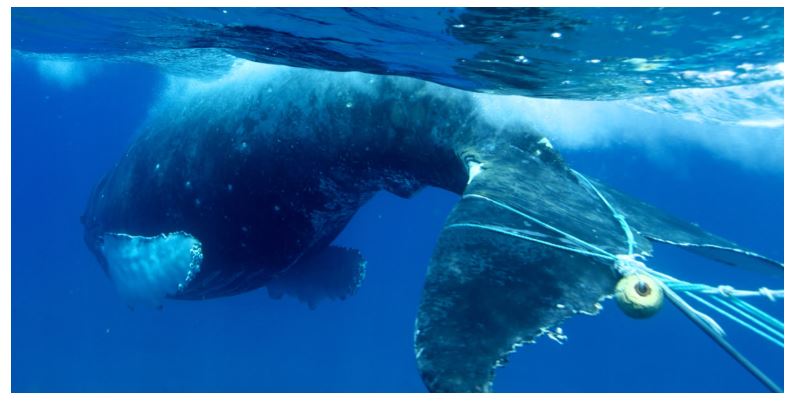
NOAA Releases Whale Entanglement Study
On December 6, 2018, the National Marine Fisheries Service (NMFS) issued its National Report On Large Whale Entanglements Confirmed in The United States in 2017. NMFS confirmed 76 cases of large whale entanglements in fishing gear or marine debris in U.S. waters last year, primarily affecting humpback whales, gray whales, minke whales, endangered blue whales and critically endangered North Atlantic right whales. Documenting large whale entanglements is important for the conservation of these species — it allows researchers and resource managers to see changes over time, helps identify causes of entanglement and informs current and future management and conservation efforts.
“Entanglements can injure or kill large whales and can inhibit the recovery of endangered or threatened whale populations. The National Marine Fisheries Service’s report documenting and tracking whale entanglements provides us with important information to identify and address the causes of whale entanglements and improve disentanglement prevention and whale rescue efforts,” said Kris Sarri, President and CEO of the National Marine Sanctuary Foundation.
Confirmed large whale entanglement reports occurred off of 13 states along the Pacific and Atlantic coasts, more than half occurred in California and Massachusetts waters. Of the five species mentioned in the report, all of them spend time in national marine sanctuaries throughout the year. The National Marine Sanctuary Foundation is dedicated to supporting whale rescue, research and conservation across America’s National Marine Sanctuary System, and prevention of future entanglements by addressing causes at their source.
A strong majority of last year’s entanglements were caused by fishing gear. It is difficult to identify the point of origin of entanglement for migratory marine species like large whales that transcend state or national boundaries. On-the-water conservation work happening in national marine sanctuaries can help find cooperative solutions to reduce entanglement and innovative ways to disentangle whales when the need arises.
Highly skilled experts and trained response teams conduct large whale entanglement and response efforts under permits granted by NMFS. Members of the public should never attempt to closely approach or disentangle marine mammals they think are in distress. To report entangled whales, the public should call the 24/7 regional entanglement hotline. For more information, visit fisheries.noaa.gov/marine-life-in-distress#what-you-can-do.
To read the full National Report On Large Whale Entanglements Confirmed In The United States In 2017, visit fisheries.noaa.gov/feature-story/large-whale-entanglements-national-report
Media Contact:
Marcus Reamer
Strategic Communications Director
National Marine Sanctuary Foundation
marcus@marinesanctuary.org
301.608.3040 x 311
